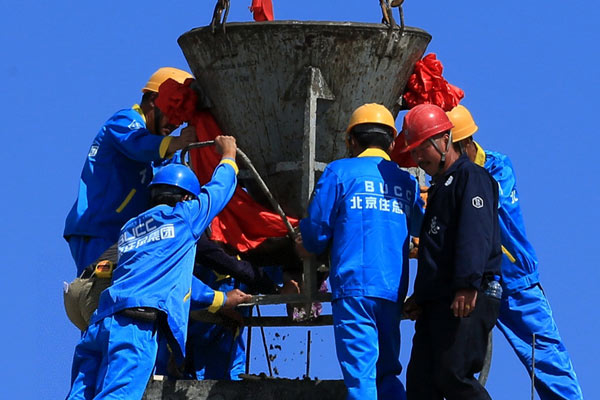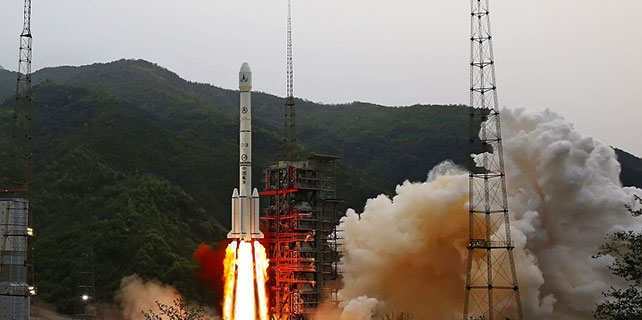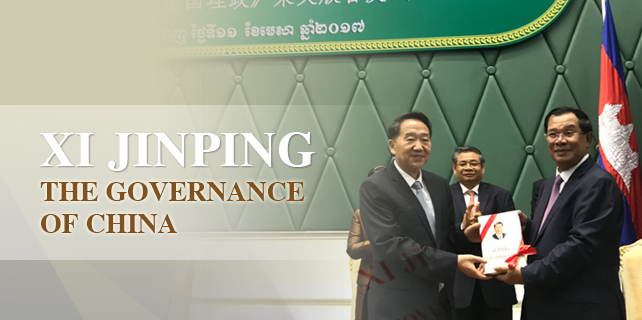Park to enhance economies of China, Belarus
 |
|
Workers pour cement to seal the roof of a building in the China-Belarus Industrial Park in June. [Photo/Xinhua] |
China National Machinery Industry, the nation's largest machinery maker by production capacity, is to build more research and development facilities, warehouses, home appliances and parts plants in the China-Belarus Industrial Park this year.
The State-owned company, known as Sinomach, will recruit more staff to work in the park, and set up sales and after-sales facilities for its products.
It is also considering moving more-advanced machinery production lines for heavy and agricultural machinery over the next three years.
Ren Hongbin, chairman of Sinomach, said Belarus, "at the crossroads of an important trade route linking the Baltic Sea to the Black Sea, and Russia to the European Union", has special strategic importance.
"The park will serve as an important manufacturing, logistics, technology services, research and development hub for the development of the Belt and Road Initiative," Ren said.
The trade, services and infrastructure network-proposed by the Chinese government in 2013-envisions a Silk Road Economic Belt and a 21st Century Maritime Silk Road that will cover about 4.4 billion people in more than 60 countries and regions across Asia, Europe and Africa.
Located 40 kilometers from the Belarusian capital of Minsk, with the Moscow-Berlin highway and the capital's airport easily accessible, the industrial park will benefit from its convenient transportation links.
The park also has ideal industrial infrastructure as it is designed to develop mechanical manufacturing, electronic equipment, bio-medicine, chemical engineering, new materials and multimodal logistics.
It can host 200 companies from different sectors, with a capacity of 100,000 workers.
Sinomach specializes in industrial tool-making, construction equipment, agricultural equipment and infrastructure construction, and operates in 35 countries and regions along the two trading routes.
The conglomerate has already attracted Chinese companies China Merchants Group, Bank of China, Lenovo Group and Geely Automobile Holdings to the industrial park.
The park will house major plants producing household appliances, electronics, and engineering and biomedicine facilities.
Chinese high-tech businesses, such as ZTE and Huawei Technologies, are also keen to join the park, Ren said, adding that tax exemptions will be offered to companies for the first 10 years, and 50 percent tax breaks for a further 10 years.
Zhou Liujun, director-general of the Ministry of Commerce's department of outward investment and economic cooperation, said the park is expected to upgrade the economic structure of both countries, promote international industrial capacity cooperation and allocate resources for larger profits on a global scale.
"China's fast-growing 4G network will provide a solid foundation for its manufacturers going forward. This will benefit greener, more efficient and sustainable industrial development in the park," Zhou said.
Belarus is an important member of the Eurasian Economic Union, connecting the Eurasian economy to the European Union. Under the tariff-free policy, products from the park will be sold in Russia, Kazakhstan, Armenia and Kyrgyzstan.
The park will also be linked to the Klaipeda Port in Lithuania, granting the companies inside the park a customs bonded area, according to the Ministry of Commerce.
Contact the writers at zhongnan@chinadaily.com.cn









